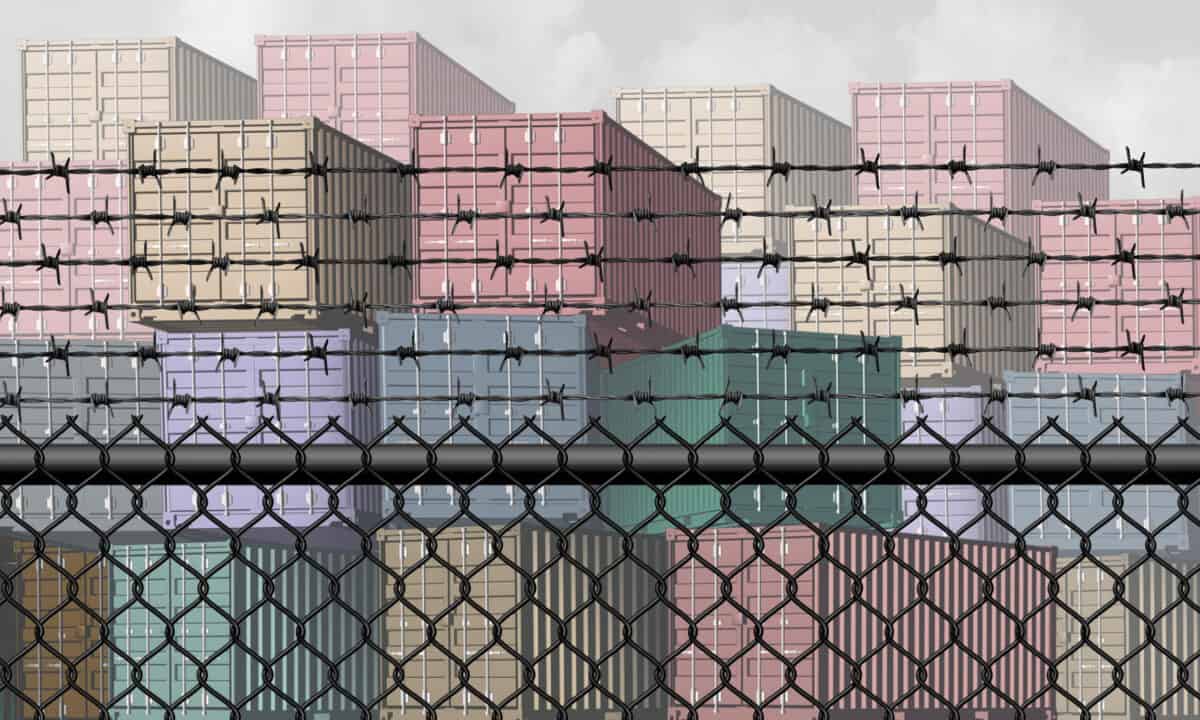
Supply Chain Disruptions Ripple from War in Ukraine
As the 2nd quarter of 2022 approaches, the world continues to confront massive supply chain disruptions. Oddly, 2022 showed some promise of calm and stability in world markets. The latest Covid surge was slowing, allowing for production and manufacturing to return to normal in southeast Asia. American ports were finding relief in their previously heavily congested cargo bays and berths. The American economy continued adding jobs and surging ahead with strong earnings and low unemployment. The rest of the world started to echo these moves.
And then a disruption that has threatened to crater these gains: War.
Russia invades one of the most mineral-rich nations on the planet. The catastrophic loss of life and threat to a democratic nation’s sovereignty has thrown the world once again into chaos.
To be clear, while this piece is an exploration of supply chain disruptions, it should in no way diminish the horror and terror of war and its impacts on those in Ukraine. This war is an abomination and should be condemned outright and the atrocities are horrific and beyond the pale. The impacts of this war, however, are being felt globally in a multitude of ways – and likely will be for quite some time. This article examines some of these ancillary impacts.
The end or the beginning
Many experts are speculating that this war will force sourcing and transportation innovations for the world’s supply chains. More than 30 years ago, the world began linking together a global supply chain with vast networks of essentials needed to build and create international commerce connections. The access to raw materials, information, revenue, and human capital exponentially increased as the reach of our manufacturing, transportation, heightened logistics capabilities, and strategic sourcing went global.
Could this be the end of that international reach? Is it the beginning of concerted efforts to reshore or near-shore production and manufacturing as a way to compensate for supply chain disruptions? As we wrote in the fall, supply chain recruiters are being asked to source candidates with Spanish language skills more so than in the past. Mandarin and Chinese were once the dominant language requirement. But, as we see corporations adjusting to a disrupted supply chain, we see more of an emphasis on bringing things closer. Could war in Eastern Europe accelerate this existing trend?
According to a recent Goldman Sachs survey, overstocking seems to be the dominant adjustment to these disruptions. However, it doesn’t rule out the reshoring or near-shoring of production and manufacturing as well as the eventual shortening of global supply chains.
It is highly likely that there will be ongoing and severe economic penalties and sanctions placed on Russia when this war ends. The global community seems united against Russia as an aggressor. This would suggest that trade routes, shipping lanes, and raw materials sourced in Russia could no longer be viable options for producing and moving goods through the supply chain.
Russia and the Supply Chain
Russia’s aggressive stance has created numerous problems in the global economic marketplace, in addition to positioning it as perhaps the worst sovereign aggressor since World War II. These actions have spurred rapid and extensive economic responses from most of the rest of the industrialized world. As sanctions continue to be imposed upon Russia, nations like China could position themselves to fill the supply chain void left by Russia.
According to The Egmont Institute, this is not a new problem, but it’s being felt on a new and more pronounced scale. As far back as 2008, the Russia/China supply bottleneck was limiting commercial production and creating headaches for the EU and America regarding sourcing and shipping. These same supply chain disruptions are creeping up again, but this time on a much larger scale.
Russia controls almost half of all the raw palladium in the world. This is a crucial element for curbing pollution and can severely impede green energy initiatives being put in place by America and the EU. For American companies that are hiring with a greater emphasis on Environment, Social, and Governance (ESG) initiatives in mind, this could create a shift in the skill sets necessary for hiring in this realm. Robotics, stainless steel, electric batteries will also be impacted by the restriction of access to minerals supplied by Russia.
Disruptions in access to materials, shipping routes, and other war and sanction-induced impediments could cause price explosions worldwide for months to come. The United States is already seeing inflation hitting record highs of 8.5% and it could likely continue to rise with these complications.
Notice how none of this section discusses the low-hanging fruit of gas and oil production and access that nations around the world have been feeling since Russian attacked Ukraine 40 days ago.
Ukraine and the Supply Chain
Because nations in Europe are so intertwined, economic disruptions in one nation are more acutely felt by other European nations. Just as with the supply chain, the downstream effects are more immediate and long-lasting. Whereas, nations like China, The United States, and Russia are more stand-alone entities that can sometimes better withstand said upheaval.
Ukraine controls two major raw materials used around the world: Sunflower oil and neon gas. Neon is essential for microprocessors in semiconductor chips. Just as the world saw in the Summer of 2021, there could be a disruption in automobile production and distribution further exacerbating the cost of both new and used automobiles. Some studies are showing vehicle production to be down as much as 40%. It’s not just cars but all sorts of consumer electronics that will be impacted by a reduction in semiconductors and microprocessors. In a world that has been more and more reliant on technological advances, this could very well be a major and long-lasting impedance. Sunflower oil is used in all sorts of different food products and the price has skyrocketed by more than 1000% since the war began. Palm oil is an alternative to sunflower oil but has experienced some ethical and environmental issues with its procurement and production.
A key issue that doesn’t get discussed as much is the decimation of Ukrainian infrastructure and the time that it will take to rebuild. Even if the war were to end tomorrow, it would take years for Ukraine to restore itself to pre-war conditions, saying nothing of the devastation and human loss that will have to be replaced. Sanctions will remain on Russia and the world will have to help Ukraine recover and reestablish itself, which will also be costly.

Sanctions impacting global markets and supply chains.
Supply Chain Disruptions to Tech and Tech Talent
Tech companies could feel the biggest immediate supply chain crunch as a result of the Russian War on Ukraine. The world’s supply chains were rapidly advancing towards a more steady state of digitization, which streamlined procurement and acquisition while effectively monitoring supply chains that spanned the globe. These efforts required specialized design of semiconductors and microprocessors that rely on raw materials sourced in these now war-torn regions. However, yet another impact is on the talent required to deploy a lot of the increased digitization.
Ukraine has become a hub for outsourced IT and tech talent that companies all over the world could access. Various Russian tech companies also had access to US and EU nations which will be feeling the pinch of having to source different tech solutions and talent.
Finally, any foreign nationals from Russia that would likely be able to acquire sponsorships could have their access to western nations greatly reduced. This cuts off a talent pipeline from a supply chain that is already suffering from a supply chain talent shortage.
These tech and tech talent disruptions will require a rapid and thorough adjustment by supply chain employers and professionals to compensate for the losses. The solutions will not be easy.
Government Intervention and Supply Chain Impacts
It is a well-established economic principle that markets thrive and produce sustainable gains when allowed to grow on their own without having to be propped up by government stimulus and cash injections. Robust stimulus packages during the Pandemic has resulted in interest rate hikes that rarely, if ever, happen during an economic downturn. Currency devaluations have dedicated this response. While this is happening, war breaks out that upsets the delicate balance of pandemic recovery that was starting to ripple across the world’s markets. Supply chains were once again thrown into chaos as shipping prices skyrocketed with the price of gas and oil and the reduction in access to established shipping lanes and transportation routes.
What will be the long-lasting impacts on supply chains from continued sanctions as well as economic assistance for Ukrainian recovery? Which nations will bear the brunt of those burdens and to what degree?
Finally, to what degree can nations’ supply chains separate themselves from geopolitical entanglements? Technology has made the world much smaller and provided immediate access between the furthest points on the planet. In what ways will divergent governing, political, and human rights policies be felt by our economies? Do we have stop-gaps in place that can account for these developments?
Conclusion
The impacts of war on the nation’s supply chains will be felt for many years to come. This particular conflict has created hardships most acutely and immediately felt in the tech and automation world of supply chains, consumer electronics, and shipping and transportation. Logistics and sourcing professionals will have to become more strategic in how they operate just as the world was beginning to normalize from the severe Pandemic disruptions. Eastern Europe will feel the impacts more severely than isolated nations, but the tech and talent crunch will have global impacts, along with the disruptions of shipping and receiving and the time and money that will be required to aid in the recovery of a nation decimated by a devastating loss of life and infrastructure. It is also too soon to tell how losing access to Russian minerals like oil, gas, and palladium will continue to impact the world for the long haul, but it is unlikely that sanctions will be relaxed any time soon. Only time will tell, and in the meantime, logistics and supply chain professionals will continue to have their hands full navigating increasingly turbulent waters due to ongoing and ever-changing supply chain disruptions.
